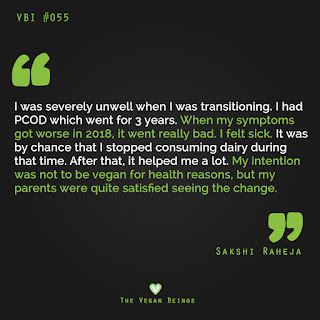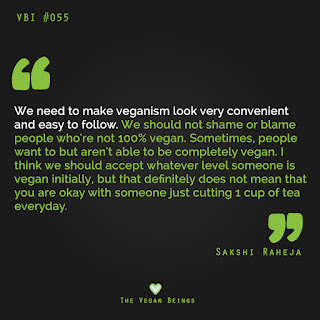This day, 3 years ago, I decided to adopt veganism immediately after realising what I was contributing to. I was 17 years old and I was told I was being naive and that it was just a phase. Three years later it has become a way of life and if a phase looks like this, we can call it that :D
In November 2018, I went to a restaurant where for the first time I read the word vegan. I used to drink more than half a litre of coffee, eat cheese, paneer, ghee almost every day back then. Three days later, it clicked to research why people went vegan. I got to know more about the dairy industry and the cruelty involved. During that time, I decided that I no longer want to contribute to this industry and should go vegan. I stopped consuming milk, paneer, and curd immediately.
It took me a few months to stop consuming cheese and ghee completely. I was struggling with ghee because in my house ghee is used quite a bit. I also started getting conscious of all my actions especially while purchasing anything. I started making an effort to be vegan in all other lifestyle products. Gradually, I also started following a minimalist lifestyle.
I believe if I can go vegan, so can you. It's all about making the connection. And life is too short to live without compassion and kindness. Life is too short to spend while contributing to the cruelty of the innocent.
My family earlier hadn't accepted veganism completely but they did passively support it. Also, there was a good coincidence. I was severely unwell when I was transitioning. I had PCOD which went for 3 years. When my symptoms got worse in 2018, it went really bad. I felt sick. It was by chance that I stopped consuming dairy during that time. After that, it helped me a lot. My intention was not to be vegan for health reasons, but my parents were quite satisfied seeing the change.
Today, my family's dairy consumption is negligible. And we have also started a vegan food delivery kitchen in Pune which completed one year recently. (Click here)
Coming to activism, my approach is NOT to go very extreme which includes blaming & shaming people who consume animal products. If you look at it from the perspective of others, they are not aware of it. There are two kinds of people: One who is not aware of the cruelty happening behind the products they are consuming and second the people who know but their mind cannot accept it. I focus on the people who don't know because it is not their fault. When you become an activist, it's our job to make sure that you are making people aware. There's a lot of blame game going on companies like Amul, McDonald's or Keventers. Many call such companies or slaughterhouse workers as devils, they are heartless, etc. To people who know and they're not going vegan, there's a perspective from their side too. Most of them have been socially conditioned for what they're doing. It would be weird if you go to someone and directly say: Go Vegan. When you're asking someone to go vegan, we're telling them to bring a huge change in their eating habit. This requires effort.
We need to be considerate and approachable when we're introducing the concept of veganism and should focus on educating them.
We need to make veganism look very convenient and easy to follow. We should not shame or blame people who're not 100% vegan. Sometimes, people want to but aren't able to be completely vegan. I think we should accept whatever level someone is vegan, but that definitely does not mean that you are okay with someone just cutting 1 cup of tea everyday. What I am intending is to respect them, taking their time to change and motivating them to not stop. Because neither of us went vegan in a snap.
I'm working on inspiring people to take any form of activism and to mobilise them. With social media, it has become so easy to share and reach out to people. Going vegan is just one step, but what is more important is to spread the word about it. So many people are going vegan but a very few people are taking up activism. Activism is not protesting or shouting slogans. Even when we're speaking to someone about why you are vegan and how animals are suffering, you are still doing activism. At the same time, providing resources to them is also activism. If 200-300 people see your story, it's possible that maybe 10 people might go through it. We never know who!
Veganism is a systematic change where we need to educate everyone including producers, consumers as well as government bodies too. The government knows what's happening, but in this change, producers have to gradually change their production methods, the consumers have to change their consumption habits and the government also has to bring change at the policy level.
I agree that the whole world won't go vegan at one instant, however, there will be some economic impact on certain sectors. We need to consider the rehabilitation of people involved in such sectors.
I've not interacted directly with people involved in slaughterhouses. I want to do that. However, from my secondary interaction, I know that these people don't feel good about what they are doing. They don't want to separate the calves, they don't want to torture the animals but they are trapped. Most of their job roles are wage per hour, which is not stable. Being a psychology student, I know how they need to shut down their emotions to work in such situations. Eventually, one day this emotional constipation is going to burst out in some other form. It can be a mental health problem that we most of the time overlook. Imagine every morning they have to kill animals
One of my friends was researching this topic. What came out from his research was that most of the people are involved in slaughterhouses because of their social disability. It is their acquired status because their parents were also involved in the same profession. They don't have a stable job. Veganism is a sociopolitical issue and at the same time an economical issue.








